
Virtual Archaeology Review
metrics 2024
Revolutionizing Archaeological Practices with Cutting-Edge Methodologies.
Introduction
Virtual Archaeology Review, published by UNIV POLITECNICA VALENCIA, EDITORIAL UPV, is a distinguished open-access journal dedicated to the dynamic fields of archaeology and conservation. Based in Spain, this journal has made a significant impact in the academic community, reflected in its outstanding Q1 ranking in Archeology and Conservation for 2023, alongside impressive standings in related disciplines such as Computer Science Applications. With an active commitment to promoting the accessibility of knowledge since 2010, it provides a platform for researchers, professionals, and students to share innovative findings and methodologies in virtual archaeology, fostering collaboration across disciplines. The journal's impact factor and its strategic focus on advancing the practice of virtual methodologies in archaeology underscore its vital role in bridging technology and heritage studies. By embracing a multidisciplinary approach, Virtual Archaeology Review not only enhances academic discourse but also drives the development of effective conservation strategies, making it an essential resource for those dedicated to the preservation and appreciation of our cultural heritage.
Metrics 2024
 0.79
0.79 1.60
1.60 1.80
1.80 17
17Metrics History
Rank 2024
Scopus
JCI (Web Of Science)
Quartile History
Similar Journals
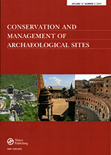
Conservation and Management of Archaeological Sites
Preserving the Past, Shaping the Future.Conservation and Management of Archaeological Sites is a pivotal academic journal published by Routledge Journals, Taylor & Francis Ltd, focusing on the interdisciplinary fields of archaeology and conservation. With an ISSN of 1350-5033 and an E-ISSN of 1753-5522, this journal strives to publish high-quality research that addresses critical topics related to the conservation and management of archaeological sites, fostering dialogue between practitioners, researchers, and policymakers. Despite being categorized in the third quartile (Q3) across multiple relevant categories such as Archaeology and Conservation in the 2023 rankings, it remains a significant resource for professionals seeking to enhance their understanding and application of best practices in site management. The journal plays a crucial role in disseminating knowledge that contributes to the preservation of cultural heritage, making it an essential read for anyone involved in these vital fields. Published since 1995, the journal not only reflects the growing importance of archaeology in today's society but also provides a platform for emerging research that will shape future conservation strategies.

Archeomatica-Tecnologie per i Beni Culturali
Fostering Collaboration for Cultural Heritage Innovation.Archeomatica-Tecnologie per i Beni Culturali is a prestigious open-access journal dedicated to the field of cultural heritage technologies. Published by ARCHEOMATICA, this journal prides itself on disseminating high-quality research focused on innovative methodologies and technologies that enhance the preservation, conservation, and management of cultural assets. Since its inception in 2011, Archeomatica has fostered an inclusive platform for researchers, professionals, and students to share insights and advancements in the integration of science and technology within the cultural heritage sector. With a commitment to accessibility, all articles are freely available, promoting a collaborative academic environment. This journal is essential for those interested in bridging the gap between cultural heritage preservation and technological innovation, helping to ensure the longevity of our shared history.

Conservar Patrimonio
Unveiling Insights for Heritage Preservation.Conservar Patrimonio is a leading academic journal dedicated to the fields of conservation and museology, published by the ASSOC PROFISSIONAL CONSERVADORES-RESTAURADORES PORTUGAL. Established as an open access platform since 2005, it aims to disseminate high-quality research and innovations essential for the preservation of cultural heritage. With an impressive 2023 impact factor, Conservar Patrimonio holds a Q2 ranking in Conservation and a Q1 ranking in Museology, reflecting its significant contribution to both disciplines. The journal is indexed amongst the top 30% of publications in the Museology category and offers valuable insights into the methodologies and practices that shape the conservation of cultural artifacts. Researchers, professionals, and students are encouraged to engage with the latest findings, case studies, and theoretical explorations presented in this esteemed journal based in Portugal, enhancing the global dialogue on conservation practices.

Azania-Archaeological Research in Africa
Illuminating Africa's Cultural Narratives.Azania-Archaeological Research in Africa, published by Routledge Journals, Taylor & Francis Ltd, stands as a premier academic resource in the field of archaeology, specifically focusing on African archaeological research. With a remarkable tradition dating back to 1966, the journal spans over half a century of rigorous scholarship, aiming to enrich our understanding of Africa's diverse cultural and historical narratives. Currently indexed in the prestigious Q1 category for both Archaeology and Arts and Humanities, it ranks impressively in the Scopus database, placing within the top 12% of journals in its field. This commitment to excellence facilitates the dissemination of innovative and insightful research, catering to a broad audience of researchers, professionals, and students alike. While the journal is not open access, its impactful contributions continue to shape contemporary archaeological discourse, making it an essential resource for anyone passionate about the study of Africa's archaeological heritage.
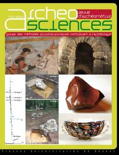
ArcheoSciences-Revue d Archeometrie
Unveiling the Past: Bridging Science and ArchaeologyArcheoSciences-Revue d Archeometrie is a prominent scholarly journal dedicated to the field of archaeology, published by PRESSES UNIV RENNES in France. With an ISSN of 1960-1360 and an E-ISSN of 2104-3728, this journal has gained recognition for its focus on the intersection of science and archaeological research, aiming to foster interdisciplinary dialogue and innovative methodologies within archaeological studies. Although coverage of the journal has been discontinued in Scopus post-2021, it has maintained a respectable standing with a Q3 Quartile ranking in both the Archaeology (Arts and Humanities) and Archaeology categories as of 2023, as well as commendable Scopus rankings in relevant fields. As an accessible platform for researchers, professionals, and students, ArcheoSciences offers valuable insights into applied techniques and findings in archaeological science, making it an essential resource for those involved in the historical and cultural analysis of material relics. Researchers are encouraged to explore this journal to stay informed about frontier research and ongoing discussions in the discipline.

Conservation Science in Cultural Heritage
Elevating Standards in Cultural Heritage ScienceConservation Science in Cultural Heritage is a leading academic journal dedicated to advancing the field of conservation science and museology, proudly published by MIMESIS EDIZIONI since 2001. Operating as an Open Access journal, it facilitates unrestricted dissemination of research to scholars, professionals, and students worldwide, promoting the exchange of innovative ideas essential for preserving our cultural heritage. With ISSN 1974-4951 and E-ISSN 1973-9494, the journal has earned recognition for its rigorous scholarly contributions, achieving a Q3 ranking in both conservation and museology categories as of 2023. It ranks at the 57th percentile in Museology and the 44th percentile in Conservation according to Scopus metrics, reflecting its growing impact in the academic community. The journal publishes a diverse range of articles, covering interdisciplinary aspects of conservation practices, research methodologies, and case studies, offering critically important insights for furthering understanding and promoting best practices in the safeguarding of cultural artifacts. Through this international platform, Conservation Science in Cultural Heritage aims to inspire collaborative efforts and elevate the standards of research in the vital area of cultural preservation.
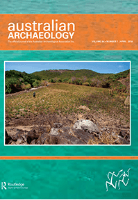
AUSTRALIAN ARCHAEOLOGY
Unearthing Australia’s Rich Heritage.AUSTRAILIAN ARCHAEOLOGY, published by Taylor & Francis Ltd, is a leading academic journal dedicated to the field of archaeology. With a strong reputation as evidenced by its Q1 ranking in both the Arts and Humanities and Social Sciences categories, this journal fosters the growth and dissemination of pioneering research from diverse archaeological contexts. The journal has been a vital resource for scholars and practitioners since its convergence in 2002, supporting the collective advancement of knowledge in the archaeological discipline. By offering a platform for rigorous analysis and critical discussions, AUSTRAILIAN ARCHAEOLOGY appeals to a wide audience, from established researchers to students beginning their journey in archaeology. Although it is not an Open Access journal, the insights provided are invaluable for enhancing understanding and appreciation of Australia’s rich archaeological heritage. With a Scopus ranking that places it among the top contenders in its field, this journal continues to contribute significantly to outstanding archaeological scholarship and professional practice.
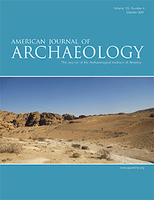
AMERICAN JOURNAL OF ARCHAEOLOGY
Connecting Cultures Through Archaeological DiscoveriesThe American Journal of Archaeology (ISSN: 0002-9114, E-ISSN: 1939-828X), published by the esteemed University of Chicago Press, stands as a leading scholarly journal in the field of archaeology, celebrated for its rigorous peer-reviewed research. With an impressive impact factor that places it in the Q1 quartile for both archaeology and archaeology within the arts and humanities, this journal ranks among the top 15% in its field, according to Scopus metrics. It serves a global audience of researchers, professionals, and students, facilitating the dissemination of innovative findings from excavations, historical analyses, and methodological advancements. While primarily available through subscription, the journal's archives and features provide invaluable resources for deepening one's understanding of the past and engaging with current archaeological discourse. Operating from its home in Chicago, USA, the American Journal of Archaeology actively contributes to the advancement of knowledge and scholarship in archaeology, making it an essential platform for those invested in the exploration of ancient civilizations and cultural heritage.

Egyptian Journal of Archaeological and Restoration Studies
Preserving Heritage, Shaping Scholarship.Welcome to the Egyptian Journal of Archaeological and Restoration Studies, a vital resource for scholars and practitioners in the field of archaeology and restoration. Published by the renowned SOHAG UNIV PUBLICATION CENTER-SUPC, this journal aims to disseminate cutting-edge research that illuminates the rich archaeological heritage of Egypt and beyond. With ISSN 2090-4932 and E-ISSN 2090-4940, this journal showcases innovative methodologies and interdisciplinary approaches, significantly contributing to our understanding of cultural heritage preservation. The journal's growing influence is reflected in its Q3 ranking in multiple categories, including Archaeology, Conservation, and Cultural Studies as of 2023, alongside its noteworthy placement within the Social Sciences. Open access options provide wider accessibility to essential studies, making it an indispensable tool for researchers, professionals, and students alike. Join us in exploring the past and shaping the future of archaeological scholarship.
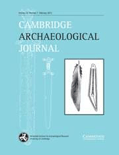
CAMBRIDGE ARCHAEOLOGICAL JOURNAL
Illuminating the Past, Inspiring the FutureThe Cambridge Archaeological Journal, published by Cambridge University Press, is a premier academic journal dedicated to archaeology and cultural studies. With an ISSN of 0959-7743 and an E-ISSN of 1474-0540, it has established itself as a leading platform since its inception in 1991, showcasing groundbreaking research that significantly contributes to our understanding of human history and cultural heritage. The journal currently ranks in the top quartile (Q1) across various categories, including Archaeology and Cultural Studies, underlining its impact and relevance in the field. The impact factor reflects its esteemed position, with Scopus ranks placing it within the 90th to 93rd percentiles among its peers. Researchers, professionals, and students alike benefit from its insightful analyses and interdisciplinary approaches, making it an essential resource for advancing knowledge in archaeology and related fields. The journal is based in the United Kingdom, at the Edinburgh Building, Shaftesbury Rd, CB2 8RU, Cambridge, England, and continues to drive scholarly conversations through its commitment to excellence and innovation in archaeological studies.